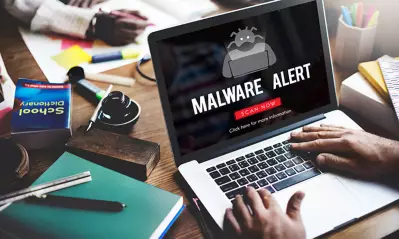
Online Cybersecurity Degree
Bachelor of Science in Cybersecurity Degree
Our Bachelor of Science in Cybersecurity degree helps prepare you to play a vital role in stopping cyber threats. As an IT security professional, you’ll build secure firewalls, detect hacker attacks, and maintain system protection. Expand your knowledge and skill development through cybersecurity courses in the Cybersecurity Analyst Defender to align with industry certifications. Become the guardian of an organization’s most valuable asset — its data.
- EC-Council partner, Academia Partner of the Year and Academic Circle of Excellence award-winner
- Courses that align to industry certification exams such as EC-Council's Certified Secure Computer User, Certified Ethical Hacker and Certified Network Defender
- Receive discounts on third-party exam fees
- A learn-practice-apply methodology that includes activities and assignments that map to in-demand industry skills designed to prepare you for a variety of employment opportunities
Ignite Your Passion
Start when you're ready
Courses
Browse courses for your online cybersecurity degree
Your cybersecurity degree courses provide a deeper understanding of a variety of topics essential for IT security including cyber domain, networking analysis, fundamental security concepts to mitigate vulnerabilities, security operations, cloud computing and wireless security. Coursework for this program aligns to many critical cybersecurity skills including disaster recovery, administrative network strategy and network defense fundamentals.
Look for this icon to see which skills you’ll learn in a course.
Requirements: 120 credits
Requirements include core courses that provide foundational cybersecurity knowledge and skills, electives that let you specialize your online cybersecurity degree in areas of interest and general education courses that provide skills important for overall career development. You’ll need 120 credits (3 credits per course) to complete this Bachelor of Science in Cybersecurity. Your course schedule may vary based on transferable credits or credits earned through the University's Prior Learning Assessment.
Your core courses will cover areas of cybersecurity including network defense, ethical hacking, web and cloud computing security and more. Your coursework also includes two capstone projects that require a demonstration of cybersecurity knowledge and skills learned in the program.
Elective courses let you explore areas of cybersecurity that are of interest to you such as cloud technologies and Java Programming that can enhance your cybersecurity career goals.
Your general education courses help you round out your cybersecurity education with important soft skills such as critical thinking, ethics and governance and policy. These and other soft skills help prepare you for troubleshooting, problem-solving and decision-making in your career.
Schedule
Your academic counselor will help schedule your courses for a Bachelor of Science in Cybersecurity.
Earn career-relevant skills in weeks – not years.
Learning shouldn’t take years to put into practice. That’s why we’re empowering you to build career-relevant skills with every five- to six-week course.
We’ve worked with the labor market researcher Lightcast to identify in-demand skills for occupations and mapped those to our related associate, bachelor’s and master’s degree programs.
EC-Council and technology-aligned learning
The International Council of E-Commerce Consultants (EC-Council) certifies individuals in various e-business and information security skills. Certifications are offered in over 150 countries globally.



Consecutive Academia Circle of Excellence Award Winner from 2019 to 2023. Academia Partner of the Year Award winner in 2024 and 2025.

Get ready for cybersecurity EC-Council certification exams
Your Bachelor of Science in Cybersecurity content aligns to the following EC-Council certification exams:
| Courses | Prepares you for |
|---|---|
|
Foundations of Security
|
EC-Council Certified Secure Computer User (CSCU) exam
|
|
Computer Network Defense 1, 2 and 3
|
EC-Council Certified Network Defender (CND) exam
|
|
Ethical Hacking 1, 2 and 3
|
EC-Council Certified Ethical Hacker (CEH) exam
|
|
Risk Assessment Insider Threat and Reporting |
EC-Council Certified Incident Handler (ECIH) exam EC-Council Certified Hacking Forensics Investigator (CHFI) exam |
|
Computer Forensics Investigative Process Computer Forensics Lab Network Wireless, Web, Email and Mobile Forensics Project Digital Forensics |
EC-Council Computer Hacking Forensics Investigator (CHFI) exam
|
|
|
Your EC-Council benefit
- 50%+ discounts on exam vouchers for industry certification exams
- Bypass required exam application when you take our courses
- Content developed by the EC-Council using their own materials and labs — all aligned to several industry certifications
Tuition
Paying for school
Tuition is based on number of credit hours per course. Courses are typically 3 credits, but can range from 1-6 credits. Costs do not include savings opportunities like transfer credits and scholarships.
What affects the overall cost of my program?
Your full program cost can vary by:
- Savings opportunities. Your cost could be reduced with eligible transfer credits, scholarships, employer discounts and more. Students with eligible credits and relevant experience on average saved $11K and 1 year off their undergraduate degree at University of Phoenix.
With our Tuition Guarantee, you pay one flat, affordable rate from the moment you enroll to the day you graduate from your program.
Discover ways to save time and money on your degree with our Savings Explorer® tool:
Other ways to save on time and tuition
Because we believe everyone deserves an affordable education, we work hard to help our students achieve one. Here’s a few ways you can save time, save money and avoid starting from scratch.
Transfer credits
Your prior eligible college credits can lower your cost and help you graduate sooner. As a transfer-friendly university, we accept eligible credits from 5,000+ accredited institutions.
Employer tuition benefits
Are you employed? Check to see if your employer has an alliance agreement with us for education benefits. This can help you save money while gaining skills that could apply to your job.
Credit for life experience
We look at all your relevant experience, from parenting to past jobs, to help you get the college credits you deserve. For every 3 credits earned, shave 5 weeks off your degree.
Alumni savings
Are you a Phoenix alum? If so, you’re eligible for special tuition rates and can save up to $2,880 on a bachelor’s degree. You can also save with an alumni scholarship.
Military savings
If you’re an active-duty service member in the U.S. Armed Forces or an eligible spouse or dependent, you may be eligible for a lower, military tuition rate and can save on tuition.
National testing providers
Do you have expertise in a specific subject? Earn college credit based on your performance on national, standardized tests to save time and money on tuition.
We can help you get started
Chat with an experienced advisor who can guide you through tuition, financial aid, scholarships, transfer credits and more.
- View 1
- View 2
- View 3

Budget & borrow
How to pay for college
Paying for school can be intimidating, but we’re here to help you make sense of it. Our finance advisors can walk you through your options like federal financial aid and savings opportunities to minimize your debt. Plus, we can help you figure out your financial plan.
Careers & Outcomes
What can you do with an online cybersecurity degree?
According to the Bureau of Labor Statistics about 16,000 openings for information security analysts are projected each year, on average, over the decade. Be prepared with the skills and knowledge you need for an IT security career. The BLS Projected Growth for 2024-2034 is published by the US Bureau of Labor Statistics. This data reflects the BLS’ projections of national (not local) conditions. These data points are not specific to University of Phoenix students or graduates.

When you earn your Bachelor of Science in Cybersecurity you’ll be equipped with a concrete set of skills you can apply on the job. You’ll learn how to:
- Examine an organization's infrastructure to ensure compliance with cybersecurity standards and policies.
- Evaluate organizational policies and strategies to determine potential cybersecurity vulnerabilities.
- Apply a variety of hacking tools and techniques to expose risk and protect and secure network systems in a variety of organizations.
- Apply the known phases of ethical hacking to protect and secure networks systems in a variety of organizations.
- Apply object-oriented scripting to solve potential cyber-security attacks.

Top skills learned in this program:
Security policies
Vulnerability
Network security
Information systems security
Cybersecurity

A BSCYB can help prepare you to be an:
- Information Systems Manager (IS Manager)
- Information Systems Supervisor (IS Supervisor)
- Information Technology Manager (IT Manager)
- Cyber Information Security Analyst
- Cyber Security Analyst
- Cyber Security Specialist
29% growth
According to the Bureau of Labor Statistics, job growth for IT security analysts is projected to be much faster than average between 2024 and 2034.
The BLS Projected Growth for 2024-2034 is published by the US Bureau of Labor Statistics. This data reflects the BLS’ projections of national (not local) conditions. These data points are not specific to University of Phoenix students or graduates.
Admissions
Apply for free – no application fee, no obligation.
Starting your cybersecurity degree is a big decision — and we want you to feel great about it. That’s why we remove obstacles from your application.
- No cost to request prior transcripts
- No entrance exam required for the cybersecurity program
- No SAT/ACT required
- No essay required
- We’ll request transcripts at no cost to you, when possible, and we accept eligible credits from over 5,000 accredited institutions.
How to enroll at University of Phoenix

Gabriel G., Enrollment Rep
Receive 1-on-1 support
You have a support team of real people you can lean on. And our academic counselors, who are with you every step of the way, have earned a 5-star rating from 85% of our surveyed students.[1]
[1] Transactional Survey, September 2022-August 2023 (23,739 respondents)
Start a conversation with an enrollment representative today.
Call us at 844-937-8679 or chat with us 7 days a week.
Receive 1-on-1 support
You have a support team of real people you can lean on. And our academic counselors, who are with you every step of the way, have earned a 5-star rating from 90% of our surveyed students.[1] Start a conversation with an enrollment representative today.
[1] Transactional Survey, August 2021-22 (18,645 respondents)

Call or chat with us 7 days a week.
Student Experience
Balancing family, work and school
Work toward your degree without giving up what matters most. Start your degree year-round and take one class at a time.
Online learning
Enroll in online classes and attend class whenever it fits your life, day or night.
Around-the-clock support and resources for your cybersecurity education
You have a support team available up to 14 hours a day, 5 days a week while you earn your cybersecurity degree.

Faculty Spotlight
Learn from professionals working in IT
As a university built for working adults, we believe you should be taught by faculty who practice what they teach. The IT curriculum they teach today is designed to help you make an impact in your day-to-day work tomorrow, bridging the gap between academics and industry knowledge.

Edward Spear MIS, MS CIS, MS MGMT, MS HRM, MS Global MGMT, Doctoral Candidate MIS
Faculty, College of Business and Information Technology

Alan Raveling DCS
Faculty, College of Business and Information Technology
Industry Spotlight
The state of cybersecurity
As the internet becomes more vital for life and business, so does the demand for online security. The cybersecurity industry is centered around protecting data from cybersecurity attacks. An organization’s infrastructure must be compliant with cybersecurity standards and policies and vulnerabilities need to be identified to protect and secure data and network systems.
What IT security professionals need to know
The industry needs ethical hackers to protect and defend against ransomware, malware, and all forms of cyber-attacks. The EC-Council Certified Ethical Hacker (CEH) exam is recommended for cybersecurity professionals.
Your cybersecurity degree
Your Bachelor of Science in Cybersecurity includes three courses focused on ethical hacking so that you get hands-on experience in footprinting and reconnaissance, firewalls and honeypots, SQL injection attacks, hacking web applications, and more.
Classroom skills for real world experience
Think like a hacker to stop hackers
Our IT faculty use a learn-practice-apply methodology to provide hands-on experience that applies your skills in real-world cybersecurity scenarios. Learn the strategies and methods that would be used by a malicious hacker, then develop countermeasures to shore up a system’s defense.
Accreditation
Accredited for 45+ years
Since 1978, University of Phoenix has maintained institutional accreditation by the Higher Learning Commission (HLC), hlcommission.org. Learn more about the value of University of Phoenix accreditation and how it benefits our students.
Frequently asked questions about the Bachelor of Science in Cybersecurity
Cybersecurity is the practice of protecting against the criminal or unauthorized use of electronic data, or the measures taken to achieve this. Cybersecurity includes protecting computer and network systems from the theft of, or damage to, their hardware, software or electronic data, and any disruption of the services they provide.
Upon graduation from a Bachelor of Science in Cybersecurity degree program, graduates have potential for careers in private or public sectors, as well as federal agencies, criminal justice agencies, hospitals—really anywhere data is stored electronically. Possible jobs include information security analyst, network and computer systems administrator and tech services.
In a normal circumstance, students can graduate with a Bachelor of Science in Cybersecurity degree in approximately 47 months with no prior college credits. But with University of Phoenix, students can save both time and money by submitting previous educational, job or life experience for evaluation for potential credit through the Prior Learning Assessment. On average, students working toward a bachelor's degree with prior eligible college credits and relevant life experience saved $11k and 1 year off their undergraduate degree.
University of Phoenix offers career-relevant education, provides career services, hires real world faculty and has more than 100 degrees and certificates aligned to over 300+ occupations. Choose from a variety of certificates that you can add to your Bachelor of Science in Cybersecurity degree that can allow you to become specialized in many different areas.
We also offer exceptional flexibility. You can log in and complete course work on your time, receive around-the-clock support and choose from frequent start dates. Plus, students can pursue our tuition savings and scholarship opportunities, which can make earning their degree more affordable and take less time.
The Bachelor of Science in Cybersecurity degree program offers two ways to customize your education. Choose from several elective courses you can take throughout your program. Or choose from lower division and upper division certificates to add to your program. Your Enrollment Representative can help you find the right electives and certificates to take based on your career goals.
While widely available, not all programs are available to residents of all states. Please check with a University Enrollment Representative.






